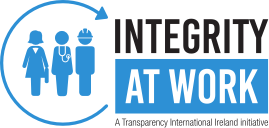
The Integrity at Work (IAW) Conference is the only national event dedicated to exploring how employers across all sectors can foster a culture of integrity within Irish workplaces. This year’s event focused on the measures that employers and regulators need to take to prepare for the regulatory changes, introduced by the new Protected Disclosures (Amendment) Act 2022 which has transposed the EU Whistleblowing Directive into Irish law.
This online Conference comprised eight webinars held over four days from 21-24 November. We were joined by 33 speakers including local and overseas experts, covering a range of topics from ‘Reporting Persons and Channels for Protected Disclosures’ to ‘Values at Work’ and ‘Barriers to Accountability’. Below is a summary of the key themes and discussion points that emerged from this year’s conference.
Changing a work culture
Ombudsman and Information Commissioner Ger Deering set the scene for this year’s Conference by looking at the consequences of workers not speaking up about misconduct in the workplace and how pressure not to tarnish a company’s reputation suppresses employees from reporting wrongdoing. The greatest challenge in shifting this dynamic is to convince employers of the need to cultivate a more supportive work culture when it comes to making disclosures and whistleblowing.
In our opening panel, Dr. Eddie Molloy stressed that cultural change is a developmental challenge that requires sustained engagement initiated by senior management. Senior managers are the transmitters of work culture, as their behaviours and values shape how the rest of an organisation operates. Their active commitment to improving workplace culture is vital for creating meaningful change.
Measures for safeguarding workers
Our keynote speaker this year was Emma Reilly, a former worker at the UN Human Rights Council in Geneva who blew the whistle that the Council was sharing the names of Uyghur dissidents with the Chinese government. Emma spoke about the effects that whistleblowing can have on well-being when faced with retaliation from an employer. Without adequate safeguards, whistleblowers can be alienated and penalised for speaking up. To prevent potential harm, employers must embed policies and practices that protect whistleblowers. This should be reflected in codes of conduct, accessible reporting channels and clearly delineated accountability structures.
Our ‘Establishing Effective Reporting Systems’ panel discussed how the Protected Disclosures (Amendment) Act 2022 places detailed requirements on how to establish systems to receive and manage reports within specific timeframes. Rody Butler of the Garda Síochána Ombudsman Commission said that employers need to humanize the process of making disclosures and make sure timely feedback is given to ensure those who make disclosures are not left in the dark. In our ‘Dealing with Workplace Issues’ panel, Philip Brennan from Raiseaconcern urged employers to protect staff who raise concerns, even for cases that don’t fall neatly within the scope of the Protected Disclosures Act. Employers who go above and beyond to support their employees in facilitating disclosures will earn greater trust from their staff in the long run.
The Business Case for Whistleblowing
Despite the stigma that can be placed on whistleblowers and perceptions of them being troublemakers, whistleblowers are often some of the highest-performing employees and demonstrate a commitment to upholding the ethical standards of an organisation. Organisations that facilitate a supportive environment for speaking up, also enhance their reputation both internally and externally. Conversely, the risk of suppressing whistleblowers can force workplace issues to be made public, which may create far greater legal and PR challenges for businesses. The bottom line is that the implementation of robust whistleblowing policies is a common-sense approach to enhancing business reputation, gaining employee trust and identifying problem areas in a business that may not have been addressed without the intervention of whistleblowers. This was summed up by International Whistleblower Lawyer, Mary Inman’s advice to employers, not to shoot the messenger.
